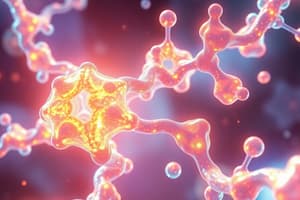Podcast
Questions and Answers
What type of bond forms between water molecules due to their polar nature?
What type of bond forms between water molecules due to their polar nature?
- Ionic bond
- Covalent bond
- Van der Waals interaction
- Hydrogen bond (correct)
Which of the following features is primarily responsible for the unique properties of water?
Which of the following features is primarily responsible for the unique properties of water?
- The high specific heat capacity (correct)
- The linear structure of its molecules
- The presence of carbon atoms
- Its low molecular weight
Which of the following macromolecules is formed by a condensation reaction?
Which of the following macromolecules is formed by a condensation reaction?
- Polypeptides (correct)
- Fructose
- Nucleotides
- Glucose
What property of lipids allows them to form biological membranes?
What property of lipids allows them to form biological membranes?
Which statement regarding enzyme function is true?
Which statement regarding enzyme function is true?
Flashcards
Carbon's role in life
Carbon's role in life
Carbon is the fundamental element for organic molecules in living organisms.
Water's high specific heat
Water's high specific heat
Water can absorb a lot of heat without a large temperature change. This stability is crucial for regulating biological temperatures.
Enzyme function
Enzyme function
Enzymes are biological catalysts that speed up chemical reactions in living organisms by lowering the needed activation energy.
Macromolecule types
Macromolecule types
Signup and view all the flashcards
Importance of pH
Importance of pH
Signup and view all the flashcards
Study Notes
Practice Exam Overview
- Focus on AP Biology Unit 1: Chemistry of Life
- Includes 30 multiple-choice questions (MCQs) and 3 free-response questions (FRQs)
- Exam structure mimics the AP Biology format
Multiple-Choice Questions (MCQs)
- Evaluates understanding of chemical foundations of biology
- Covers concepts such as:
- Structure and function of water
- Properties of carbon compounds
- Importance of macromolecules (carbohydrates, proteins, lipids, nucleic acids)
- Role of enzymes in biological reactions
- Biological significance of pH and buffers
- Answers require reasoning and application of concepts
- Questions involve diagrams, graphs, and data interpretation
Free-Response Questions (FRQs)
- Assess in-depth understanding of key topics
- Require explanation, analysis, or application of concepts
- Topics may include:
- Comparison of biomolecules and their functions
- Experimental design related to enzyme activity
- Impact of pH on biological molecules and systems
- Responses should be well-organized and demonstrate critical thinking
Study Notes for Chemistry of Life
- Key elements in biology: Carbon, Hydrogen, Oxygen, Nitrogen, Phosphorus, Sulfur
- Water properties:
- High specific heat; regulates temperature
- Solvent for polar substances; essential for chemical reactions
- Cohesion and adhesion; critical for plant transport and surface tension
- Carbon's versatility:
- Four valence electrons; forms stable bonds with many elements
- Backbone of organic molecules; enables complex structures
- Macromolecules:
- Carbohydrates: Sugars (monosaccharides, disaccharides, polysaccharides); energy storage and structure
- Proteins: Composed of amino acids; structure determines function; enzymes as catalysts
- Lipids: Hydrophobic; energy storage, membrane structure, signaling molecules
- Nucleic Acids: DNA and RNA; genetic information storage and transmission
- Enzymes:
- Biological catalysts; speed up reactions by lowering activation energy
- Specificity determined by shape; affected by temperature, pH, and concentration
- Acids and Bases:
- pH scale; measures hydrogen ion concentration
- Buffers maintain pH stability in biological systems
- Importance of homeostasis; organisms regulate internal conditions
Exam Preparation Tips
- Familiarize with key terms and definitions
- Practice multiple-choice questions for concept reinforcement
- Develop clear, concise responses for free-response questions
- Use diagrams and models where applicable to visualize concepts
- Collaborate with peers for discussion and clarification of topics
Studying That Suits You
Use AI to generate personalized quizzes and flashcards to suit your learning preferences.



